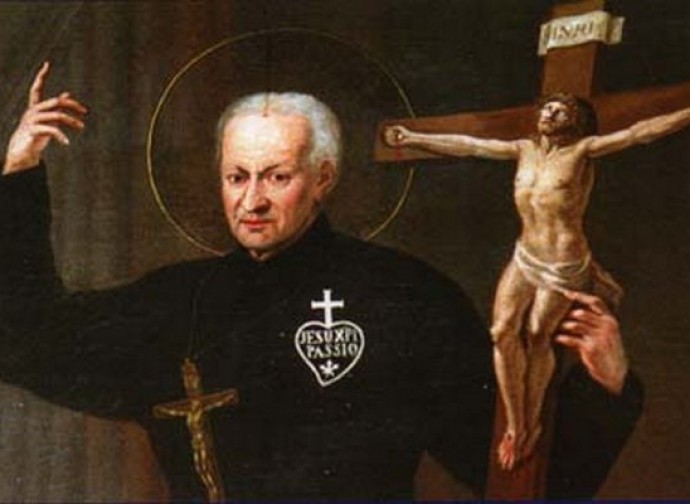Saint Paul of the Cross
“It is an excellent and most holy thing to think about the Passion of the Saviour and meditate on it. This is the means to arrive at union with God”, taught St Paul of the Cross (1694-1775), who one day found himself mystically dressed in a black habit with a white cross on his chest and the name of Jesus in white letters.

“It is an excellent and most holy thing to think about the Passion of the Saviour and meditate on it. This is the means to arrive at union with God”, taught St Paul of the Cross (1694-1775), who one day found himself mystically dressed in a black habit with a white cross on his chest and the name of Jesus in white letters.
From that vision he felt inspired to found an order, which he called the Congregation of the Discalced Clerics of the Most Holy Cross and Passion of Our Lord Jesus Christ, whose members are commonly called Passionists (one of the most illustrious to wear the Passionist habit was Saint Gabriel of Our Lady of Sorrows in the 19th century). The rule, very austere and approved for the first time in 1741 by Benedict XIV, provides for a fourth vow which consists precisely in propagating the memory of the Passion, from which “as from source, all good derives”.
The second of sixteen children, together with his younger brother John Baptist he used to erect a cross in the places where he went to preach. The two did not hesitate to flagellate themselves in order to induce hardened hearts to reflect on the sufferings experienced by Jesus and His love for each person. In his catechesis, together with fraternal charity, constancy in prayer is central: “Do not be troubled by the aridity you feel in prayer, nor by distractions when they are involuntary. It is by this means that God purifies the heart, so that it is more willing to unite itself more perfectly to the Supreme Good. [...] Above all, never leave prayer”. To revive it, he exhorted us to imagine ourselves on Calvary and to turn every thought to Jesus crucified. In the same way he advised us to face temptations, which “humble us, instruct us, purify us like gold in fire” and “overcome us with humility and the holy fear of God; the devil is afraid of the humble who distrust themselves, he fears them and flees from them”.
In the Holy Week of 1768 he committed to adoration for a whole day. It was then that the Lord impressed on his heart the instruments of the Passion, a particular stigmatisation in which he felt “a mixture of excessive love and excessive pain”. He loved to call Our Lady with the title of “Queen of Martyrs” for her participation in the sufferings of her Son: he entrusted the protection of the Order to her. With the help of Mother Mary of Jesus Crucified he also created the female branch. In the Rule of the Passionists, now spread over the five continents, Paul gave great importance to the study of theology for the care of souls and, therefore, prescribed that all the schools of the Congregation should faithfully teach the “unassailable doctrine” of St Thomas Aquinas.
Learn more:
The mystical death by Saint Paul of the Cross
THE LIFE OF THE BLESSED PAUL OF THE CROSS
Rule of the Passionists: Rule (1775), Constitutions (1984), General Regulations (1984)
